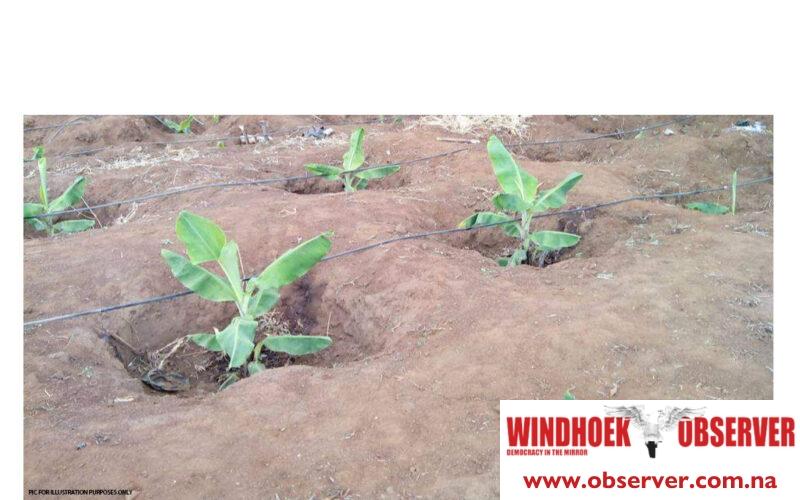Niël Terblanché
Namibia has initiated a pioneering banana industry development trial that will take the country closer to agricultural self-sufficiency and innovation,
With the planting of 2,222 banana seedlings at Mango Vuluzi farm, located in the Singalamwe area of the Zambezi region, the endeavour, known as the Banana Project, is a significant investment in the country’s agricultural sector.
This project, a collaborative effort between the Namibian Agronomic Board (NAB) and AvaGro, focuses on a one-hectare plot and involves the cultivation of two distinct banana varieties, the Grand Naine and Williams, through tissue culture techniques.
The Banana Project is aimed at nurturing the growth of Namibia’s banana industry through meticulous research and development.
According to the NAB, the project also aims to identify banana varieties that exhibit superior performance across Namibia’s diverse agro-ecological zones.
The NAB, in a statement, said the initiative is driven by the fact that bananas rank as the second most consumed fruit in Namibia and that the country depends entirely on imports to meet domestic demand.
The project was launched towards the end of February this year when the participants in the Banana Project successfully planted 2,000 Grand Naine and 222 Williams banana varieties.
These seeds were sourced from Pasture Valley, a reputable horticulture supplier and technical support provider from Eswatini.
According to the NAB, the Banana Project aims to expand its field trial sites to cover a broader range of agro-ecological zones across Namibia over the next 12 months.
This expansion involves rigorous testing of soil and water samples from potential sites to ensure land suitability for banana cultivation.
This initiative traces back to a Memorandum of Understanding (MoU) signed between the NAB and AvaGro in October 2023.
The partnership mandates a mutual commitment to enhancing Namibia’s banana industry through research and development, assessing various banana varieties for their adaptability and performance.
If deemed successful, the project will address the challenge of the scarcity of high-quality, disease-free banana seedlings suitable for Namibia’s unique soil and climatic conditions.
The project aims to bolster Namibia’s agricultural sector and to reduce the country’s reliance on imported bananas by promoting the commercialization of banana production.
AvaGro, with its commitment to shifting from traditional farming to precision agriculture, will play a crucial role in the project by leveraging its expertise in commercial farming and seedling production.
According to AvaGro, the project will pave the way for a future where Namibia can not only meet its domestic fruit consumption needs but also establish itself as a leader in agricultural innovation and sustainability in Africa.




